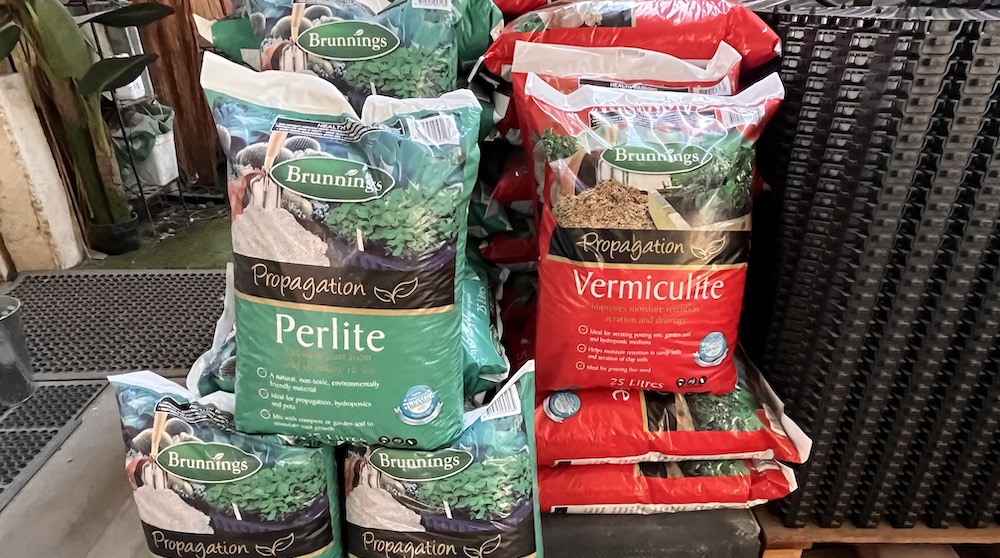What is the Best Perlite to Vermiculite Mix Ratio?

It is not unusual for gardeners to debate the usefulness of various products or the best ways to care for plants, keep away pests, etc.
These spirited discussions often include two commonly used soil additives: perlite and vermiculite.
Frequently, gardeners are at odds regarding which product is superior, if they can be substituted for each other, and what is the best ratio when mixing.
The best place to start when trying to resolve this debate and determining the best mix is understanding the individual products and their contributions to the garden.
The Best Perlite to Vermiculite Mix Ratio
The optimal mix ratio of perlite to vermiculite depends on the specific needs of the plants and the growing conditions.
Generally, we recommend a 50/50 mix for seed starting to provide both moisture retention (from vermiculite) and aeration (from perlite).
However, for plants that require more drainage, increasing the amount of perlite, or for those needing more water retention, increasing vermiculite can be beneficial.
Always consider the specific needs of your plants and adjust the ratio accordingly.
What is Perlite?
Perlite is a lightweight, organic, volcanic glass that is used in horticulture and construction for its ability to aerate and retain water and nutrients, and insulate against fluctuations in temperature.
It is made by heating volcanic glass to extremely high temperatures until it expands and pops. The perlite becomes small, white, and porous, lightweight rock when the heating and popping processes are over.
It has a cavern-like texture that helps it release water. Many gardeners say it looks and feels like tiny Styrofoam balls. However, Styrofoam is never safe to use as a substitute for perlite.
What is Vermiculite?
Vermiculite is a naturally occurring mineral that expands when heated, used in gardening for its ability to improve soil aeration, moisture retention, and nutrient holding capacity, and in construction as an insulation material.
This is mined in raw form. Horticultural vermiculite receives specific treatment after extraction. Processors will exfoliate it then and expose it to intense heat and pressure. The purpose is to cause expansion of the vermiculite as well as its sterilisation. The result is a clean, silvery-grey, flaky product with a number of functions for gardeners.
Vermiculite has no added fertiliser but naturally contains minerals that are helpful to plants.
Being eco-friendly is another excellent quality of vermiculite. It is non-toxic, non-reactive, and non-combustible.
Uses and Characteristics of Perlite and Vermiculite
Even though there are similarities between the two, perlite and vermiculite are NOT interchangeable.
Our experts have laid out the best uses and characteristics of both below:
| Uses | Perlite | Vermiculite |
|---|---|---|
| Seed Starting | Good for aeration and drainage | Excellent for retaining moisture and nutrients |
| Organic Gardening | Used for aeration | Used for moisture retention |
| Loosening Heavy Soil | Excellent for improving aeration and drainage | Good for improving soil structure and moisture retention |
| Providing Drainage | Excellent | Good |
| Retaining Moisture and Nutrients | Poor at retaining moisture, good for nutrient retention | Excellent at retaining both moisture and nutrients |
| pH Level | Neutral to slightly alkaline | Neutral to slightly alkaline |
| Decomposes in Soil | Does not decompose easily | Slowly decomposes over time |
Based on the above, there are a few reasons why these are not interchangeable, including:
- They have different rates of water retention
- The ability to aerate the soil is not the same
- They differ in the ability to provide drainage
When to Use Perlite
Remember, use perlite when your soil needs better drainage and aeration, such as if you are trying to improve heavy clay soil. It is ideal for plants that prefer dry conditions, like succulents or cacti, and perlite is helpful if you live in a humid or wet climate.
When to Use Vermiculite
It would be best if you use vermiculite when water retention is your goal. For example, if you are starting plants from seed, vermiculite is an excellent medium because seeds need sufficient moisture. Additionally, vermiculite is your best choice for repotting outdoor plants or if you live in a dry climate.
Looking For Perlite and Vermiculite
We have great stock of high-quality, bagged perlite and vermiculite. Come on down and say hi to our friendly staff!
No matter what concerns you about your garden or lawn, do not hesitate to reach out to the experts at Bibra Lake Soils.
We can advise you regarding types of soil, landscaping materials, how to keep your garden thriving, and scores of other related topics. Our team is ready to assist you with all projects, large or small.


